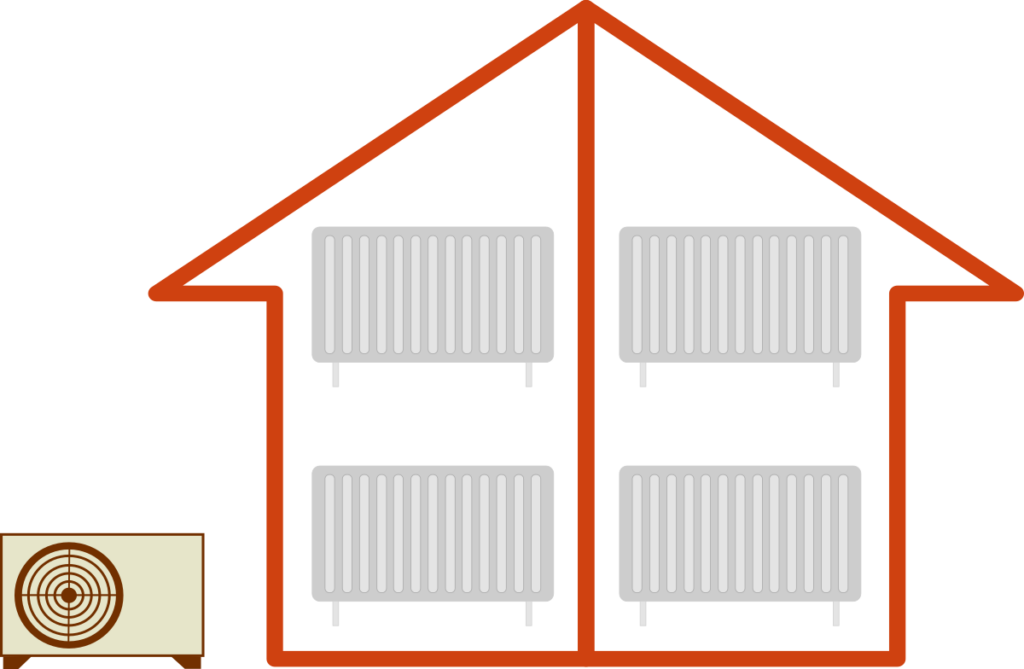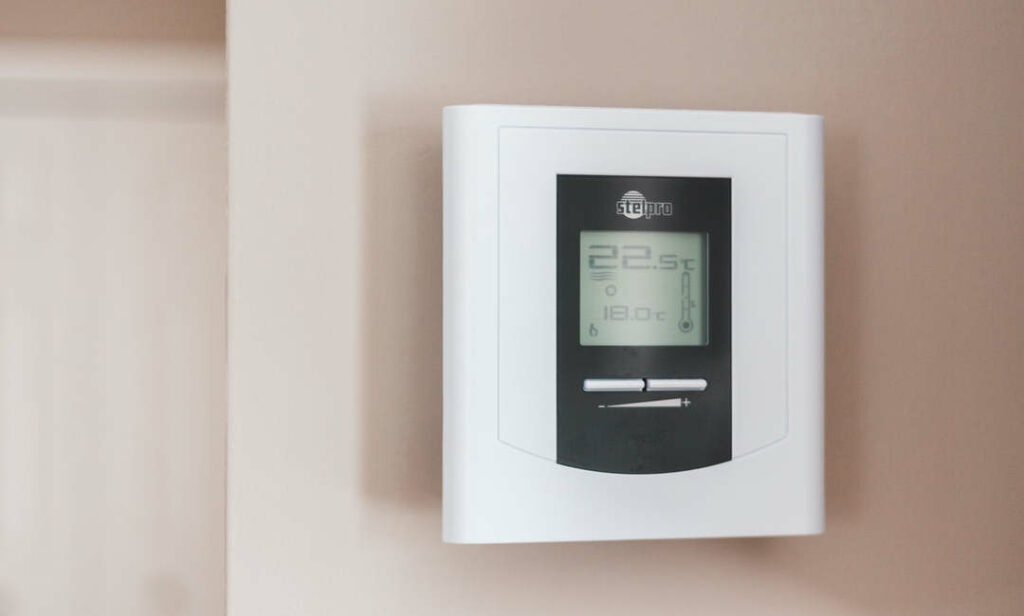Most people turn their oil or gas boiler on for just a few hours per day. But heat pump systems are always on and keep houses warm 74-7. This article explains why heat pumps run constantly.
Quick Recap: How Heat Pumps Work
Heat pumps “pump” heat from the environment (ground or air) into your radiators/underfloor heating (heater). They do this using an electric motor, compressor, and some refrigerant. On average, for every 1 unit of electricity that a heat pump uses, it can supply 4 units of heat, making the technology very efficient.

Slow and Steady is the Most Efficient Way to Pump Heat
The energy required to pump heat from outdoors into a heater depends on two things. First is the outdoor temperature. Second is the temperature of the heater. The lower the heating temperature, the more efficiently the heat pump can move heat.
While running heaters at a lower temperature is great for efficiency, it also results in lower heat output. To compensate for this, heaters run for much longer periods with a heat pump.
In practice, modern heat pump systems include a thermostat to automatically control when the heat pump runs. All the user has to do is leave the system on. The thermostat will look after the rest.
So while the heat pump might not technically be running constantly, it is always on standby and ready to provide heat any time the thermostat indicates a need. So heat pumps run many more hours per day than a boiler.

Heat Pumps Keep Homes Warm 24-7
Heat pumps are designed to meet modern standards of comfort. These standards demand that houses are always warm – not just for a few hours in the evening. To achieve this, heat pumps must be ready to run any time the thermostat detects a need for heating.
An always-warm home is often the biggest change that homeowners notice after installing a heat pump. This boost to quality of life means that heat pumps are far from just about saving energy and reducing bills.
Warning: Your House Must be Well-Insulated!
The efficiency of heat pumps makes them very cost-effective to run. Plus, they deliver an excellent level of comfort. But only if the heat pump is in a well-insulated building. Installing a heat pump in a poorly-insulated or draughty house causes two major problems:
First, installing a heat pump in a building that’s not well-insulated can result in high electricity bills. As mentioned earlier, heat pumps run most efficiently when the heaters are at a low temperature. If your house is not well insulated, heaters will need to run at a high temperature to keep it warm. In this case, the heat pump will be much less efficient, sucking up large amounts of electricity. The high electricity consumption is amplified by the heat pump running constantly. Result: Electricity bills will shoot up.
In addition to consuming a lot of electricity, heat pumps can simply fail to keep a poorly-insulated building warm enough. This can happen because the heat pump reaches its maximum output temperature (say 50 degrees C). This might not make radiators hot enough to warm a poorly-insulated building.
The solution is to get a heat pump Technical Assessment before installing a heat pump. This will tell you if you currently have enough insulation for a heat pump. And if not, it will guide you on what insulation upgrades you’ll need to get your house heat pump ready. A Technical Assessment is also an essential step towards getting a heat pump grant in Ireland.

Should You Turn Your Heat Pump Off at Night?
Generally speaking – No. You should not turn your heat pump off at night.
The reason for this is that turning your heat pump off at night will cause the temperature of your house to fall substantially below the thermostat’s target temperature. When you switch the heat pump back on, the thermostat will sense that the temperature is far below the target and run the heat pump at 100% power, with the heaters at their maximum temperature, in order to get the house quickly back up to the target temperature. This is inefficient and uses a lot of electricity.
There are exceptions, especially in houses with low thermal mass and when heat pumps have thermostats that can program a gradual rise in temperature during the day. Read your heat pump’s manual or talk with your heat pump installer to find out more about your case.
Another exception is houses with poor insulation and a heat pump. In these houses, heat pumps will be running inefficiently near 100% power anyway. And heat pumped in at nighttime escape so quickly that it will make very little difference come morning. So turning the heat pump off at night can save electricity in a poorly-insulated house. But poorly-insulated houses shouldn’t have a heat pump in the first place. And a better long-term solution than turning the heat pump off at night is more insulation.
Use A Setback Temperature On Your Heat Pump to Save Energy
As discussed above, I don’t advise turning your heat pump off at night. However, you can save electricity using a setback temperature. This means setting your heat pump programmer to run a few degrees cooler at night. This way, your house runs a few degrees cooler: Enough to save some energy overnight, but not so much that your heat pump struggles to recover in the morning.
Those on Irish time of use electricity tariffs could also consider a slight setback in heat pump temperature from 5pm to 7pm. This will reduce electricity consumption during these hours, when it’s most expensive.
Also Consider Summer Mode to Reduce Heat Pump Electricity Consumption
Some heat pumps also have a setting called “summer mode”. This saves electricity by turning off space heating entirely during spells of warm weather. Specifically, if your heat pump senses that it’s warm every day, it won’t switch on just because it got slightly cool at 4am. The pump knows the sun will soon be up and warming your home – so no need to run the heating.